How To Treat Horsefly Bites

Getting a horsefly bite while trying to enjoy a day outside can turn one of the best days into one of the worst and the most painful.
If you’re outside and a horsefly bites you, it will help to know the reactions of a horsefly bite and the best ways to treat it.
What Are Horseflies?
The horseflies are:
- Flying insects that are usually around an inch long
- Found habitating farmland areas across North America
- Known to feed on large mammals
- Most likely to breed around water
- Pesky insects with an extremely painful bite that causes inflammation and swelling
Horseflies are very similar to the regular flies, except they are much larger, about an inch long. You can often find them habitating farmland and rural areas across North America (1).
On average their food consists of large mammals such as horses, dogs, and humans. The best condition for their breeding grounds is wet areas with bodies of water, such as lakes.
Their bite is extremely painful and causes inflammation and swelling.
Are Horsefly Bites Dangerous?
Horsefly bites are often extremely painful, but they don’t usually cause a human too much danger.
However, their bites can be a problem for horses. When they bite a horse, they can transfer a life-threatening disease known as equine infectious anemia, or swamp fever.
Just like with humans, if an animal gets bit they may or may not show symptoms, but they can still pass it along to other horses and infect them as well.
What Does A Horsefly Bite Look Like?
The horsefly bite is:
- Not a puncture wound, more of a cut
- The fly has small hooks in its mouth that allows it to attach to the skin
- The area may be painful and itchy
- The affected area is typically raised and red
Horsefly bites don’t leave a puncture wound, but they leave more of a cut type sore. They leave a cut because they have small hooks in their mouths that allow them to attach to the skin (2).
Once bitten the area may feel painful and it might be itchy. The area also raises up and turns red. All these factors are indications of what a horsefly bite might look like.
Symptoms Associated with Horsefly Bite Reactions
More often than not people don’t have an acute response to horsefly bites, however some signs to watch out for include:
- Wheezing
- Feeling weak and dizzy
- Temporarily swollen skin
A severe reaction can be an emergency. You should visit a doctor if you experience any of the following symptoms:
- Difficulty breathing or swallowing
- Swelling, rash, or itching
- Diarrhea, nausea, or vomiting
The reaction to the horsefly bites isn’t always severe. However, people can be allergic, and you should know the signs so you can be aware.
If you experience wheezing, feeling weak or dizzy, or temporarily swollen skin, this could mean you have developed a severe reaction to the bite, and you should keep an eye on it.
If you are experiencing difficulty swallowing, a rash or itching, diarrhea or vomiting, call the ambulance immediately. These symptoms can turn more severe in a short time, and an urgent medical attention is needed.
How to Treat Horsefly Bites
Since horsefly bites cause more damage than the average insect, their wound often takes longer to heal. Here are some ways to address it in hopes that it will heal faster.
1. Saliva
Although this might sound gross, it’s worth a shot. Use saliva to cover the wound. Saliva should only be used as a temporary fix until you can treat it properly.
2. Clean the Infected Area
You should wash the infected area with antiseptic soap and warm water. When the area around a wound is clean from dirt and bacteria, it will often heal better and quicker.
3. Don’t Scratch
We’ve all heard it from the time we were kids, but it honestly makes a difference. Scratching will only make the healing time take longer.
4. Hot Compress
A warm or hot compress can help relieve the swelling and momentarily caring for the pain.
5. Use Cream
Often applying a medicated cream such as Benadryl will help with the swelling and suffering.
6. Cover the Bite
Out of sight out of mind. It’s not always the case, but covering the affected area can help to keep it clean and keep you from scratching it.
7. See a Doctor
If none of the above home remedies help, you should consult with a physician. He or she will be able to give you the medication needed to make a full and healthy recovery.
Horsefly Bite Prevention
Horseflies can be found in a wide range of areas so it may be hard to prevent a bite. However, following are a few tips that might be helpful to remember.
- Stay away from bodies of water where horseflies breed
- Keep your arms and legs covered
- Avoid getting overheated
- Don’t wear perfume or cologne that may attract them
- Stay out of tall grass and bushes
Horseflies breed near bodies of water, so it’s best to stay away if possible.
They are attracted to smelly perfumes. They also like to hide in tall grass and bushes. Following these tips may help you not to get bit, or to treat the bite correctly.
Sharing is caring! Your love and support motivates us!